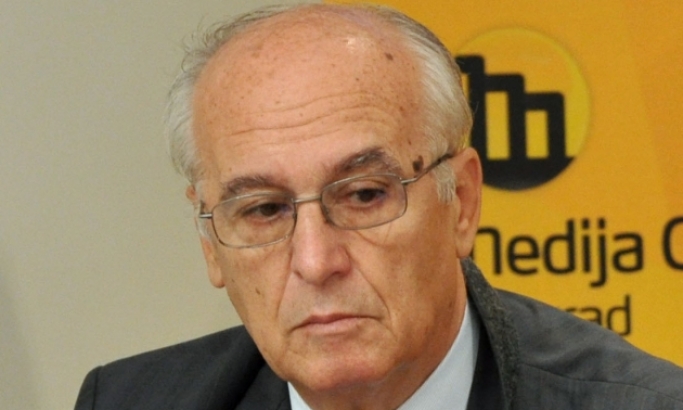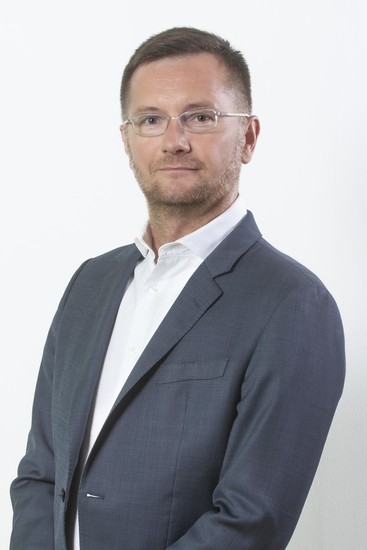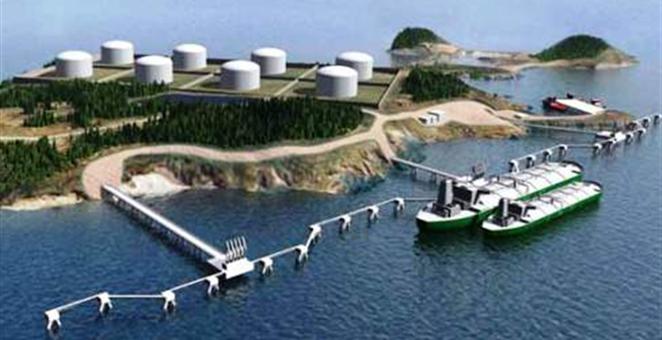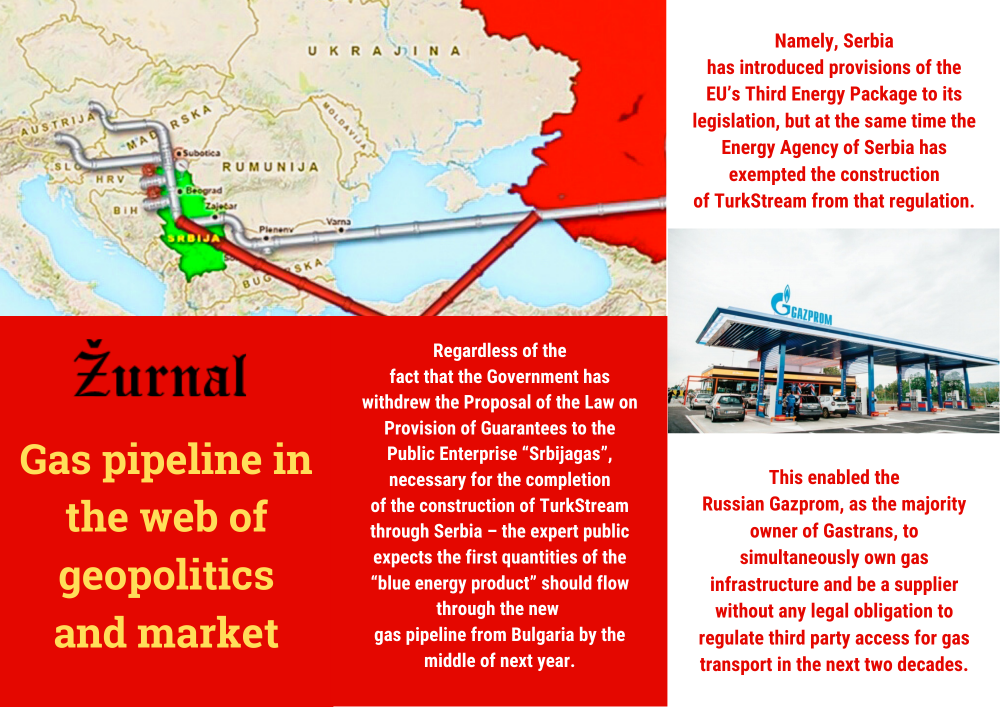Istražujemo
GAS PIPELINE IN THE WEB OF GEOPOLITICS AND MARKET: TurkStream does not introduce competition as it is reserved for Russian gas only
The product having a single supplier is the most expensive one, because then you do not know what the price is, and what the consequence of the monopoly is. We often hear that we do pay the Russian gas at the highest price in Europe, although we swear by the great friendship with Russia– says professor Goran Radosavljević

energetika.ba
Regardless of the objections made by the Energy Community about non-compliance with the EU regulations, regardless of the fact that the Government has withdrew the Proposal of the Law on Provision of Guarantees to the Public Enterprise “Srbijagas”, necessary for the completion of the construction of TurkStream through Serbia – the expert public expects the first quantities of the “blue energy product” should flow through the new gas pipeline from Bulgaria by the middle of next year. It will enable Serbia to get this energy generating product from another direction apart from the route through Ukraine, which is burdened by political instability, but it currently does not address the issue of the genuine supply diversification, which the EU insists on, because only Russian gas flows through both pipelines, and introduction of new players to the market is still a long shot.
The Secretary General of the Gas Association of Serbia, Vojislav Vuletić, points out that it is a massive and significant operation that neither the Energy Community nor the circles in Serbia, lobbying for the interests of the United States, can stop because they see the project as a competition to the distribution of American liquified gas in Europe.
- The objections made by the Energy Community that the EU regulations on implementation of energy projects are not being observed by the construction of TurkStream, as well as that it supresses the competition, are neither realistic nor serious. Their only objective is for the administration in the Energy Community to justify its existence, when it already does not have any influence in the construction of gas infrastructure in Europe. It is not true that the construction of TurkStream will prevent third parties from accessing the gas pipeline. Namely, Serbia has incorporated the European Union’s Third Energy Package into its legislation, which enables a larger number of producers to distribute their gas through gas pipelines built on the territory of our country. In practice, this means that our laws guarantee the possibility to lease gas capacity and transport through the TurkStream to all producers and distributors. It can be either Azerbaijani, Iranian, American or gas from another producer - says Vuletić, adding that it is still a theory, while the fact that no one but Russia has enough gas to meet the needs of the European consumers poses a limitation in the practice.

(Vojislav Vuletić)
All interests in a single route
That is why, according to our interlocutor, it is unlikely that the European Community or someone in the Government of Serbia, who opposes the construction of TurkStream, will stop the project, citing thereat Zorana Mihajlović, the current Minister of mining and energy.
- It is a project that would supply gas through Serbia to Hungary from one branch, and to Croatia and Bosnia and Herzegovina from the other two. It is now necessary to carry out works on the construction of appropriate infrastructure that will enable gas from Serbia to go to Hungary and other countries, and it is realistic to expect that the first quantities will flow through TurkStream from Bulgaria through Serbia by the middle of next year - says Vuletić.
The Secretary General of the Oil Committee and the professor at the FEFA faculty, Goran Radosavljević, says no great pressure was exerted by the Americans because of the construction of TurkStream, except during the signing of the agreement with the Albanians in Washington, when the item of necessary diversification in gas supply was “quietly introduced”.
- It is true that some pressure was exerted on companies that participated in the construction of Nord Stream 2, while there was less pressure for the route from Turkey then for the previously failed South Stream. They actually do not dispute the construction of gas pipeline, but are seeking the diversification of the source of supply. It will continue, because change of the administration in the White House rarely brings any changes to the US foreign policy. The strategic goal of the United States is to reduce the Russian influence in Europe, particularly generated through the energy dependence – explains Radosavljević, confirming that the construction of gas pipeline through Serbia is a massive project, which, even if there are some disagreements in the Government on that issue, is already coming to an end.

(Goran Radosavljević)
However, the Energy Community is not giving up on criticism, so had the Energy Community deputy director, Dirk Buschle, recently stated that construction of the route by which Serbia joins the TurkStream additionally reinforces the dominant position of the Russian “Gazprom” and the Public Enterprise “Srbijagas” on the market of Serbia for at least next 20 years.
Clerical games
Namely, Serbia has introduced provisions of the EU’s Third Energy Package to its legislation, but at the same time the Energy Agency of Serbia has exempted the construction of TurkStream from that regulation. This enabled the Russian Gazprom, as the majority owner of Gastrans (company in Serbia building the pipeline in which Srbijagas has minority interest) to simultaneously own gas infrastructure and be a supplier without any legal obligation to regulate third party access for gas transport in the next two decades.
Truth be told, the rules of the EU and the Energy Community, of which Serbia is a member, allow certain projects to be excluded from the application of the Third Energy Package in case the pipeline operator, in this case the Russian-Serbian Gastrans, proves, among other things, that the investment improves competition and that the exemption is proportionate to the magnitude of the risk associated with the investment.
The Energy Community stands firm in its position that Gastrans does not give any guarantees that the necessary norms will be met. On the other hand, the Energy Agency of Serbia believes that Gazprom and Srbijagas have provided all required guarantees, as well as that the construction of TurkStream improves the security of gas supply in the region. The Energy Community does not deny the latter, but claims that Gastrans was neither obliged to respect principles of competition nor it has commercial interest to do so, but that it reinforces the monopoly with this project. Therefore, the EC demands additional conditions for exemption of the Third Energy Package in this particular case, which will, among other things, condition Gastrans to reduce its own exclusive access to the gas pipeline in order to provide competition with better access to its capacities.
Despite the EC’s opposition, the Energy Agency of Serbia has adopted the right to exempt the construction of TurkStream from the Third Energy Package, emphasizing that “it has implemented all the recommendations of the EC Secretariat that it could implement in the current legal framework in order to ensure that the project does not damage competition on the Serbian market”.
There will be loans
When it comes to internal obstacles, the experts do not consider the decision of the Government, i.e. the Ministry of Finance, to withdraw the law, which would give “Srbijagas” guarantees for a loan of 70 million Euro needed to complete the works on the gas pipeline through Serbia, overly important. They claim that it is more a matter of earlier disagreements and a kind of pressure that Minister Zorana Mihajlović is exerting on the director of “Srbijagas”, Dušan Bajatović. It is speculated that the law will not be completely rejected, but that it will only be reviewed. There are claims that some figures of the operation for which the loan is taken are higher than it is realistic, so that matter will be examined. Some items might be “inflated” and a delay is the way to check them.
By the way, the loan of “Srbijagas” with Vojvođanska bank, OTP bank and Post office savings bank, for which state guarantees are needed, is intended for the construction of compressor stations, necessary for the unhindered movement of gas through Serbia to Hungary and other directions. That is part of the remaining works that should be completed by spring, because the transport pipes have already been installed in both Bulgaria and Serbia.
Waiting for market mechanisms
However, the story about gas supply does not end here. Professor Radosavljević reminds that much less space in the public was given to the project that would also enable diversification of the source of supply.
- The Liquified Natural Gas (LNG) terminal in Omišalj on Krk starts its operation on January 1, and that is very significant for our region. A ship set sail a few days ago for a test tour to a plant in Spain, where it should take over the liquefied gas and bring it to Omišalj, where it will be transformed into gas again, being further transported by the pipeline. As important as the route of TurkStream is because it diversifies the direction of delivery, the source has remained the same, Russian gas. The terminal in Omišalj is an opportunity to open the market and to introduce a real competition among suppliers. LNG can be bought everywhere, from Qatar, America or Russia, it is the same gas, only converted to liquid state at low temperature, transported like oil, by ships, tanks, and before entering the pipeline it is returned to the gaseous state - explains Radosavljević.
He emphasizes that the potential of the LNG terminal in Omišalj is modest for now, especially when compared to six billion cubic meters of Russian gas, and even the capacities of the plant and the pipeline have been leased for the next two to three years. But that opens the way for diversification of the sources of supply, and Serbia should participate in such projects because they bring security of supply. Radosavljević confirms that LNG is more expensive than the original gas at the moment, but emphasizes that the moment it becomes an alternative, a dance on the market can change everything.
- The product having a single supplier is the most expensive one, because then you do not know what the price is, and what is the consequence of the monopoly. We often hear that we do pay the Russian gas at the highest price in Europe, although we swear by the great friendship with Russia. Europe has lower prices; Bulgaria had reduced the prices at the moment it was given possibility to use multiple sources. The indication that you can get an energy-generating product from another supplier opens the path for you to negotiate the price - concludes Radosavljević.

By the way, the construction of the TurkStream section through Serbia began in March 2019 and was completed at the end of that year. The TurkStream gas pipeline started operating on January 8, and it goes along the bottom of the Black Sea from Russia to the coast of Turkey, from where it is further transported to North Macedonia, Bulgaria and Greece. The planned capacity is 15.75 billion cubic meters of gas per year, and from the branch through Serbia it would be further transported to Hungary, Croatia and BiH. It is a lucrative project for Serbia because it provides it with sufficient quantities of “blue energy product”, an alternative supply route, but also earnings from the transit tax.
Mystery of the project
It is here often mentioned that the construction of the gas pipeline had “pushed” GDP upwards in the third and fourth quarter of last year, however, actually a quarter smaller section in Bulgaria was not even felt in the economic growth. Professor Goran Radosavljević says that our GDP is at a very low level, it is $ 7.500 per capita and is one of the lowest in Europe, and since 2010, following the economic crisis, it has been accompanied by very low growth rates, so we have just reached the level of 2008. “Therefore, every major investment is immediately felt, as it was with the beginning of Fiat’s production. I don’t know exactly why there is no growth in Bulgaria because they also have low GDP. Maybe it's a question for statisticians, but in general, the construction of TurkStream is shrouded in mystery, because first we hear that the construction is finished, and then that we need a loan to complete it, so I guess that maybe some financial transactions related to that project had happened in a quarter, and they then reflected on the growth of industrial production”, says Radosavljević.
Who is constructing TurkStream
TurkStream through Serbia is built by Gastrans, which is 51% owned by the Russian Gazprom and 49% by the Public Enterprise “Srbijagas”. The main subcontractor is the Russian IDC (Infrastructure development and construction), registered in Belgrade as well as “Srbijagas”, along with the Italian “Saipem”, which also worked on the route project, and the Millennium team, a favourite company in most state affairs.
The planned capacity of TurkStream is 15.75 billion cubic meters of gas per year, and it would be further transported to Hungary, Croatia and Bosnia and Herzegovina. A total of 2.7 billion cubic meters of gas is spent in Serbia annually, which means that the gas pipeline would secure sufficient quantities of “blue energy product” both for that country and for consumers in other countries it will reach. This project is lucrative for Serbia since it provides sufficient quantities of “blue energy product”, and alternative direction of supply. TurkStream through Serbia will be 403 kilometres long, and its construction costs 1.8 billion Euro. The construction costs are borne by Gastrans, and by Srbijagas to a lesser extent. It is estimated that Serbia could collect around 50 million Euro annually from the transit tax.
Russian gas for the market of Serbia without an alternative for now
Although it was announced that the “Southern Gas Corridor”, which is being built by Azerbaijan together with several companies from Western Europe, including British Petroleum, will soon be operational, Vojislav Vuletić, Secretary General of the Gas Association of Serbia, points out that the pipeline cannot be an alternative for the supply of consumers in Serbia because all the quantities of gas that will flow through it are reserved for consumers in the countries of the European Union. The capacity of that gas pipeline for the needs of countries in Europe is 10 billion cubic meters of gas per year. “Blue energy product” from Azerbaijan and liquefied natural gas from the United States (from a terminal in Greece) will cover about 30 percent of consumption in Bulgaria, 20 percent in Greece and 12 percent in Italy. When fully completed, the pipeline’s infrastructure will allow gas to be transported to Kosovo and Bosnia and Herzegovina. The possibility of building an “Ionian-Adriatic gas pipeline” from the direction of Albania to Croatia is also being considered, but the connection with Serbia is not mentioned, at least for now.
Nord Stream 2 is mentioned as an alternative route for obtaining natural gas for consumers in Serbia and it is also operated by Russian Gazprom. Although it is technically feasible for Serbia to be supplied with gas from that direction, Vuletić explains that it is less profitable for Belgrade because it would pay numerous transit taxes to the countries through which it would pass and would be significantly more expensive than the one obtained from TurkStream.

(zurnal.info)




